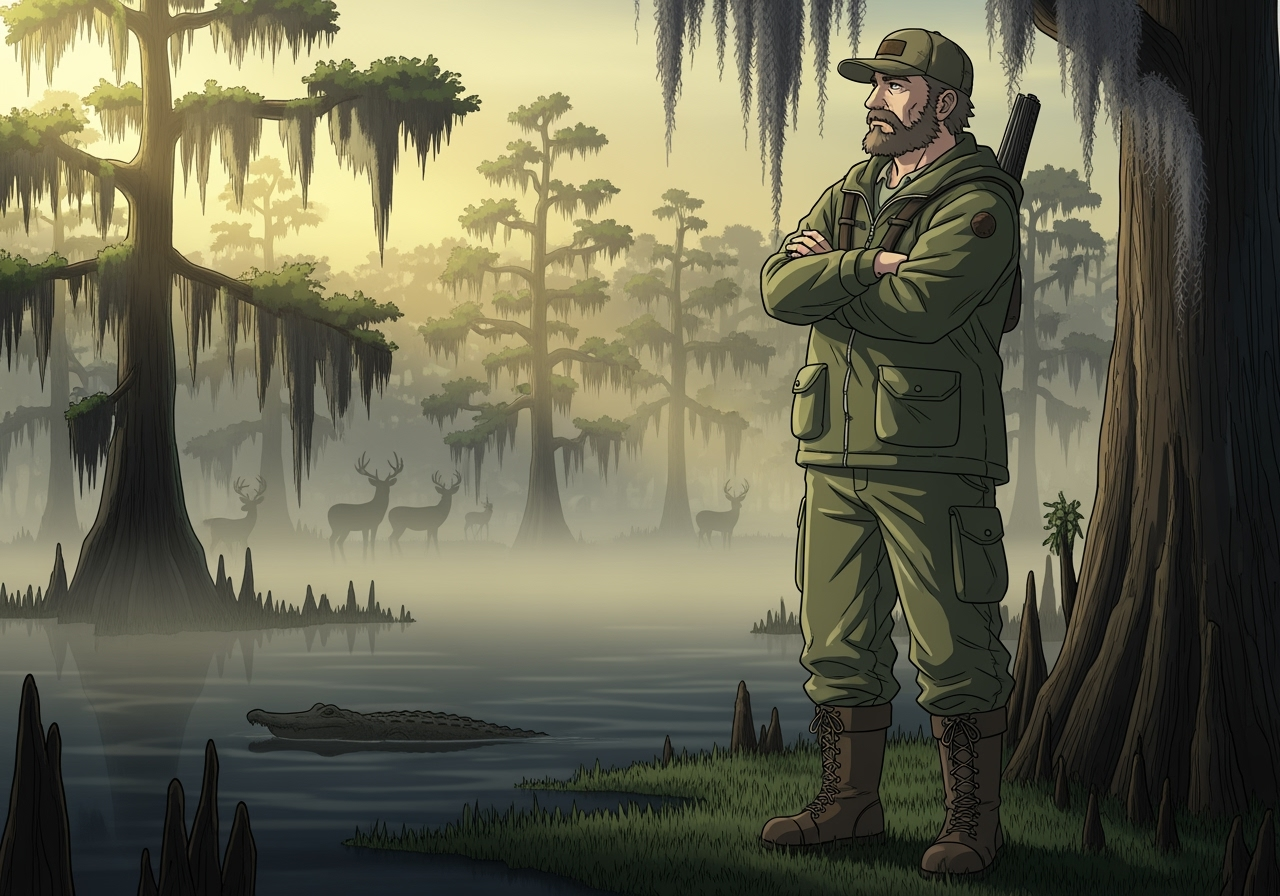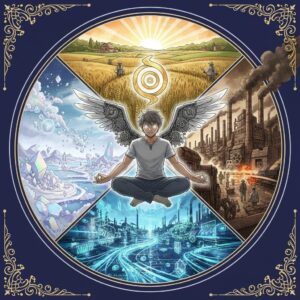Hunting mindset isn’t just about pulling a trigger—it’s about understanding our place in the natural world and what it truly means to be human. Developing a proper hunting mindset changes everything about how you see nature, survival, and your role as a predator.
Disclaimer: This is probably going to offend some people. First, I’m going to talk about hunting. Second, I’m going to challenge some popular ideas about what makes us “worthy” predators.
I’ve seen those memes on social media—the ones that say hunters aren’t worthy of hunting animals because we use weapons. “If you didn’t have a gun, let’s see you take on a lion.”
I think about that a lot.
Because part of developing a hunting mindset is about survival of the fittest. It’s about preparation, providing, and skills that I personally find virtuous. But you can tell the people making these arguments have never hunted. And that’s something I don’t find virtuous at all.
Here’s why: you shouldn’t argue a point ideologically against someone who understands that point practically.
Why Ideological Arguments Fail
Two people arguing from ideology? That makes sense. You can learn and grow from that. Two people arguing from practical experience? Also makes sense. They can reach deeper understanding.
But when someone argues from ideology against someone with practical experience, it doesn’t work. The ideological person lacks the understanding to even engage meaningfully.
The Disney Problem: Why Hunting Mindset Psychology Matters
When I hunt, it’s not from lack of appreciation for the animal. Matter of fact, I’ll argue that a hunter has more appreciation for that animal than someone who doesn’t hunt.
Now, I’m not going to give you the typical hunter reasoning—”we appreciate the animal because it gave its life for our sustenance.” That’s bullshit. The animal didn’t give its life. The hunter took its life for sustenance.
But animals are majestic creatures. To truly appreciate that, you have to understand them. And here’s where most people get it wrong.
Take the most commonly hunted animal in the United States: the white-tailed deer. When non-hunters think of deer, they think of Bambi. There’s a problem with that approach to hunting psychology.
Projecting Human Emotions Onto Animals
When we watch that movie, we overlay our human emotions onto the animal. And honestly? We don’t even know if animals experience emotion the way we do. But we do something that would be considered wrong in human-to-human interaction: we project our emotions onto that animal.
This forces us to perceive the animal through a narrative lens we create in our minds. However, if you actually observe deer behavior through a hunting mindset, you’ll see that what you’re emotionally feeling isn’t very practical.
The Doe and Fawn Reality: Natural Survival Instincts
Here’s what you’ll regularly see when hunting deer: a fawn will walk down a trail, followed by a doe.
Human instinct says if the mother sensed danger, she’d check the situation herself before sending her young into an unknown area. In contrast, that doe will gladly send her fawn into an area she suspects might be dangerous.
She’s not doing it blindly. She’ll follow that fawn and watch. If you’re present as a hunter and that doe gets any indication you’re there, she’ll stop dead in her tracks and watch what happens to her fawn before she goes in herself.
Why Mother Deer Send Fawns First
The human emotion in me makes me feel like that’s not virtuous. But the practical lens I can view it through as a hunter tells me it’s actually very virtuous.
Let me explain.
In nature, animals don’t have the luxury of a built society around them. It truly is survival of the fittest. The practical reality is this: if that young fawn dies in a dangerous situation, that fawn is lost.
But if that doe dies, not only is she lost, but that fawn likely won’t make it through winter without her. Additionally, the following breeding season, that doe could breed and make two or three more fawns.
When you look through a practical lens, you realize that outside human society, nature lives by the law of survival of the fittest. When we apply our soft emotions—emotions we’re able to develop through society—we feel like survival of the fittest is wrong or barbaric.
Really, it just comes down to sustaining a species.
The Hunter’s Perspective: Understanding Predator Psychology
There’s something about being a hunter that changes how you see these animals. When you watch them trying to survive, when you’re in their landscape—their home—you get to appreciate them for their ability to survive.
That’s a lens hunters have that someone arguing from an ideological standpoint not only doesn’t have, but can’t have. You can’t get that from this blog. You can’t get it from a YouTube video.
You can only get that knowledge and wisdom through experience. As a result, you must get out there and get in their environment as a predator.
When you’re in a wildlife refuge or national park, it’s not the same. You’re seeing the animal in a protected state where there’s no predatorial pressure from humans, so it acts differently around you in that scenario.
This connects to what I’ve learned about staying alert and avoiding complacency. Whether you’re driving 80,000 pounds down the highway or tracking an animal through the woods, awareness and respect for your environment are everything.
Alligator Lessons: Apex Predator Realization
Two weeks ago, I got to do something I never thought I’d do in my lifetime: I went alligator hunting.
In my home state, there are particular rules you have to follow.
First, you have to hunt them during a very specific season. Second, you have to catch them—you cannot bait them. It’s not like those TV shows where you set hooks with bait and come back the next day.
You have to stalk these animals. You have to catch them on a really big rod with a really big hook. Furthermore, you have to fight them and pull them in by hand—you can’t reel them in because they’re too heavy, too powerful, too strong.
Only when you get them to the boat are you dealing with one of the strongest animals we have in North America. And only then can you dispatch that animal.
Setting Boundaries With Dangerous Wildlife
This is my home state, but I just recently moved here. One of the experiences I had this summer was finding an alligator in our backyard. I’d never lived around alligators before, and with children and dogs around, it made me nervous.
But that’s okay. You set boundaries. Kids don’t play outside at night. The dog goes to the front yard instead of the back when they need to go out. Pretty easy. We avoided any incident.
Then I went to hunt these animals, and I gained a whole lot more respect for them. I also have less fear.
The 14-Footer: When Apex Predators Meet
When we were scouting that day, we saw over 25 alligators. Some big, some small. The smallest was about four feet, the largest about 14 feet.
Moreover, for every alligator we saw, we saw sign that suggested there were three more we didn’t see.
We didn’t have luck taking an animal that day, but that’s okay. The pursuit is what I enjoy, and I genuinely had a great time and learned something. I have this intuitive experience that nobody can take away from me.
The biggest alligator we came across was 14 feet long and looked like it was as big around as a Volkswagen Beetle. We went zipping past it at about 60 mph on the boat, heading with the tide. It didn’t give us a second look—just stayed right where it was.
The Moment Everything Changed
That was unusual because most alligators we saw that day ran at first sight of us. However, this big 14-footer didn’t give us another thought. It was in the channel where boats continually fly up and down, so it didn’t feel threatened. It was normal.
It didn’t feel threatened because no one’s going to mess with a 14-foot alligator unless they’re hunting it.
But when we circled back and approached slowly at idle speed, getting within about 75 yards, that alligator sensed us. When it sensed us, it slowly sank down below the surface.
A 14-foot flesh-eating reptilian monster. A creature that would terrify most humans. As we approached to play this game of cat and mouse, it sank down and eluded us.
That was the moment I realized: we are the apex predators.
Regardless of what people want to believe ideologically, we are the apex predators.
This experience reinforced everything I believe about developing a proper hunting mindset. It’s not about being the biggest or strongest. Instead, it’s about understanding systems, respecting your environment, and knowing your place in the natural order.
Understanding Our Place in the Natural Order
After our unsuccessful hunt, I went into reflection mode—because that’s what hunters do. I thought about how we could have been successful. We should have gone upstream, positioned ourselves about 200 yards away, and let the tide bring us back slowly, using only the trolling motor and only to steer.
I won’t know unless I get an opportunity like that again, but I think that would have created success.
As I reflected, I couldn’t help but think about how the world runs on systems. Nature runs on systems—ecological systems, behavioral systems. As hunters, we don’t just observe these systems from the outside.
We participate in them because we are part of them. I’m grateful to understand my place at the top of that food chain.
What Hunting Really Teaches Us
The ideological argument against hunting misses this entirely. It misses the practical reality of what we are, where we fit in the natural order, and what we can learn by engaging with that reality instead of projecting our human emotions onto it.
This hunting mindset has taught me lessons that apply far beyond the woods. Just like I discussed in my post about managing money and energy, understanding natural systems—whether financial or ecological—requires practical experience, not just theoretical knowledge.
When you understand animals as they actually are—not as Disney characters, but as creatures trying to survive in systems we’re also part of—you gain something you can’t get any other way. Respect. Understanding. And a clearer picture of what it means to be human in a world that doesn’t care about our feelings.
The hunting mindset teaches us that we’re not separate from nature—we’re part of it. And recognizing our role as apex predators isn’t about dominance or cruelty. It’s about understanding responsibility, respect, and our place in the natural order.
This hunting mindset transforms how you see not just animals, but your entire relationship with the natural world.
Ready to explore more perspectives from the road? Follow me on Facebook, Instagram, YouTube, and X for honest takes on life, survival, and what it means to be human. Don’t forget to subscribe to our weekly newsletter for more unfiltered wisdom!



